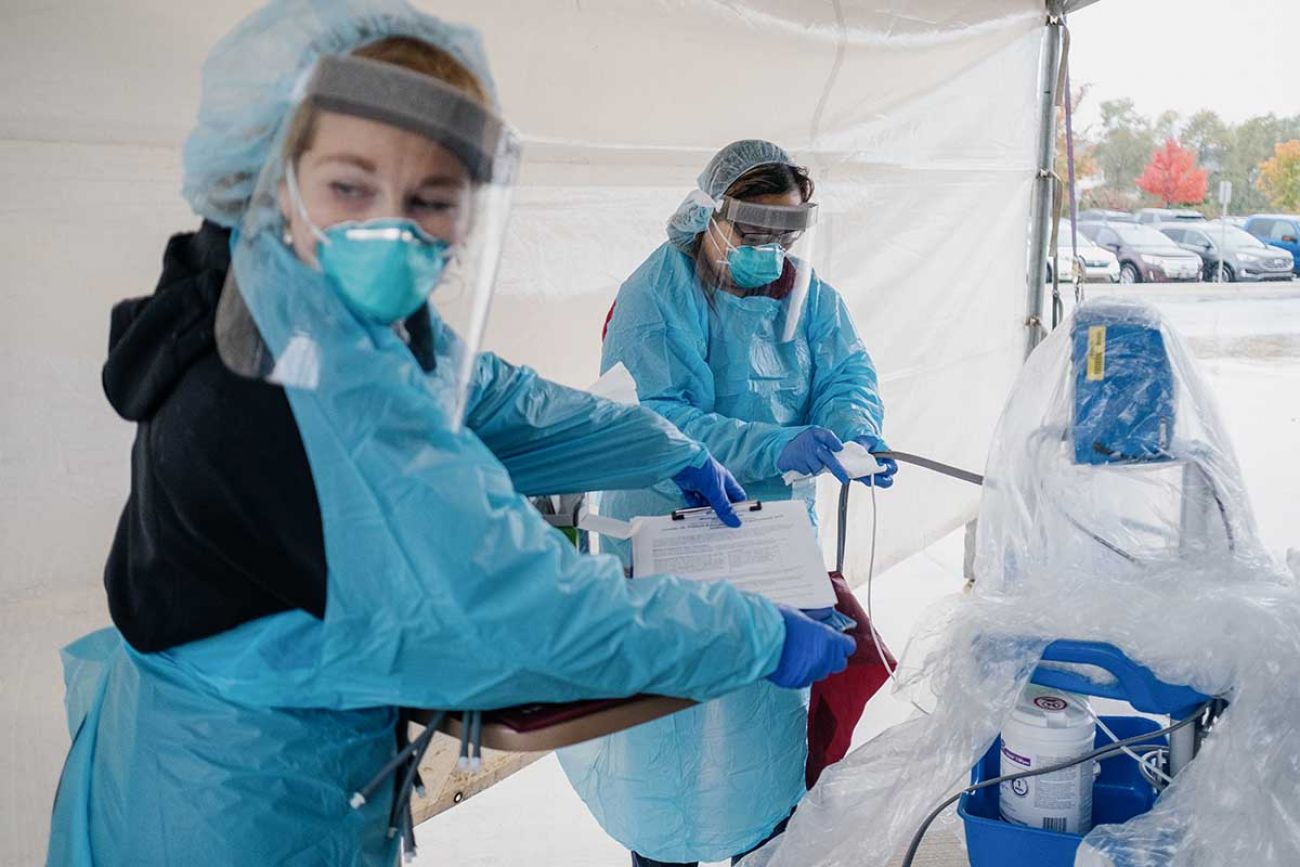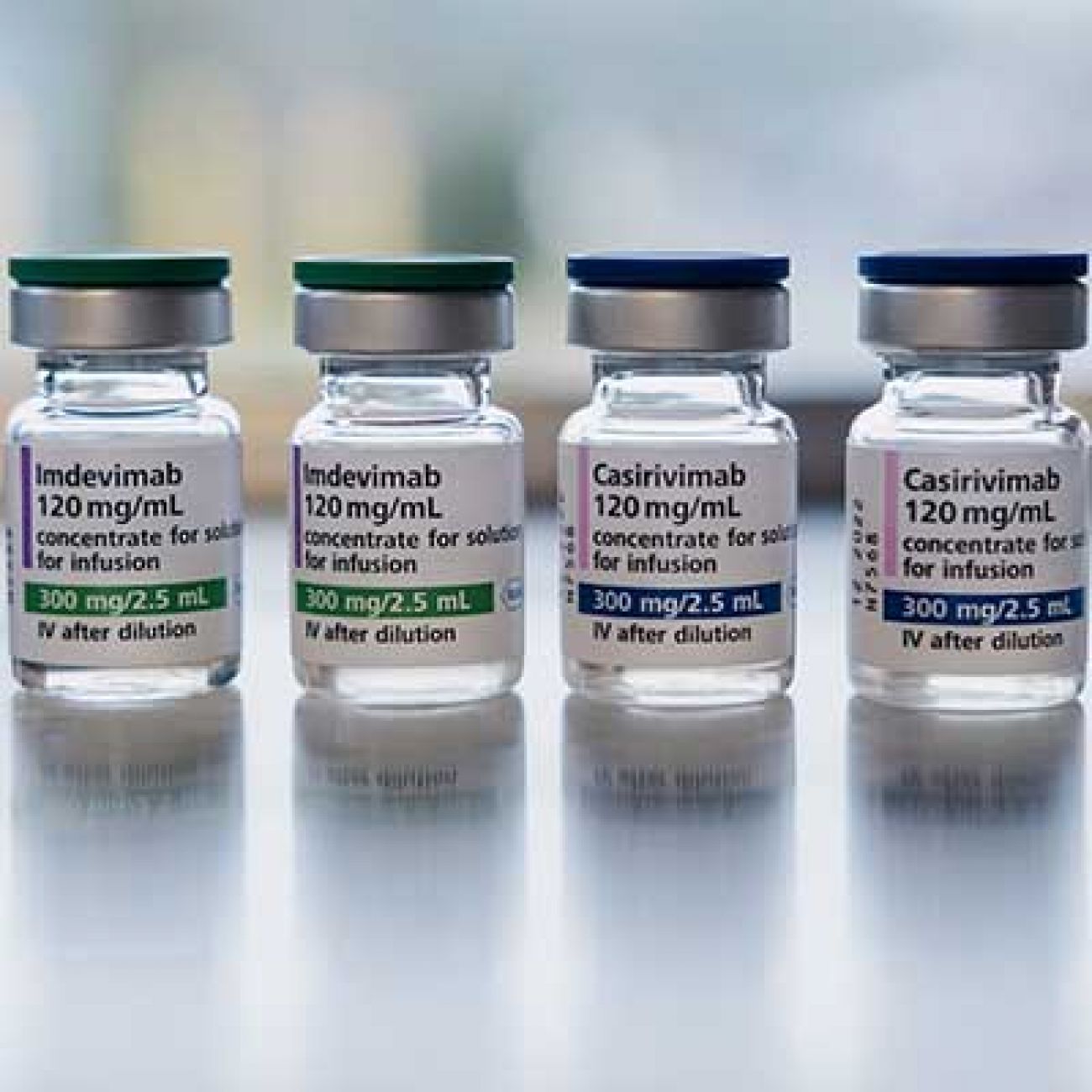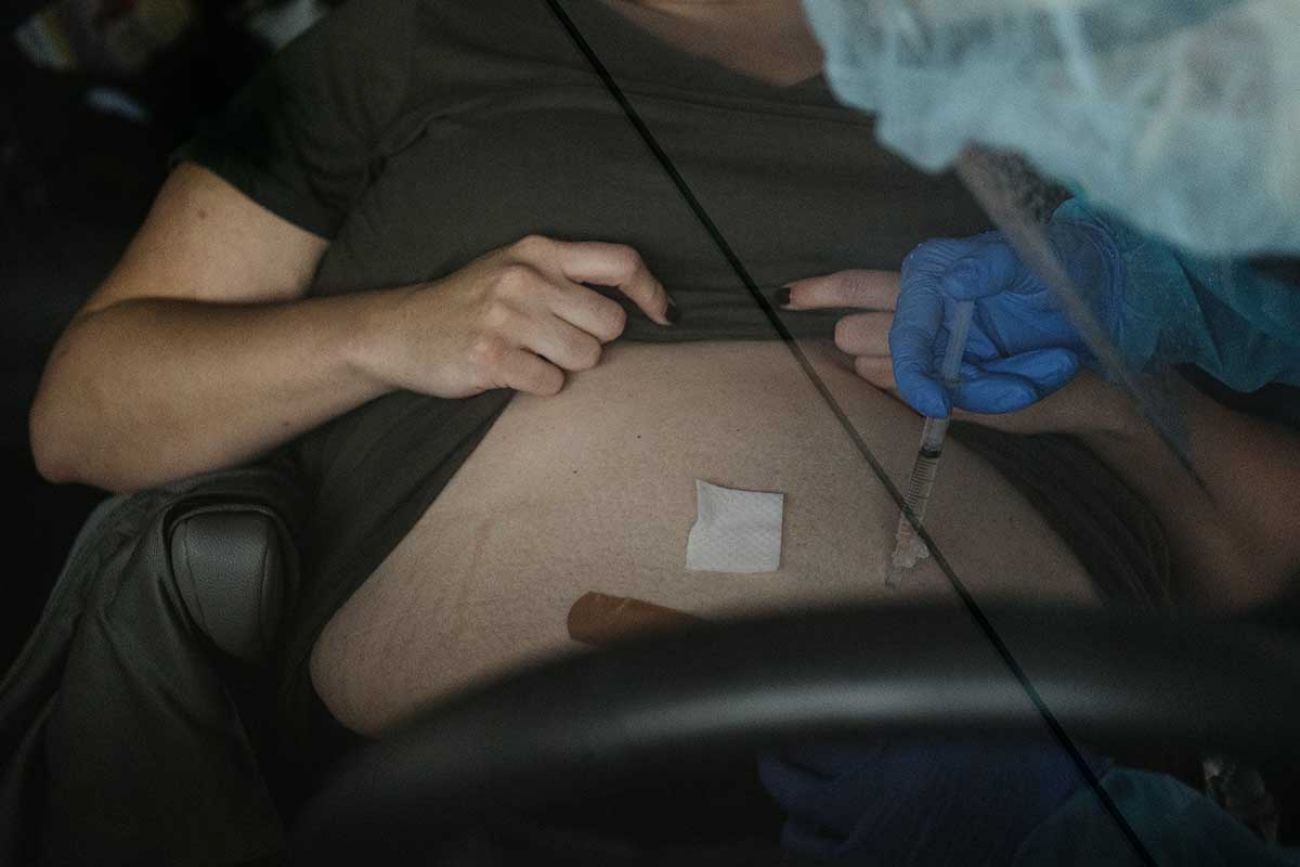Monoclonal antibody treatment gains ground in Michigan’s COVID fight

Dec. 17: Michigan State University, U-M will require COVID booster shots
Dec. 16: Michigan has an obesity problem. That could make COVID even worse
Dec. 3: Michigan hospitals at COVID-induced capacities, as moods turn angrier
Nov. 27: 85% of Michigan inpatient and ICU beds are full, some patients turned away
ANN ARBOR—Monoclonal antibody treatment, hailed for its ability to reduce hospitalization and death among people with mild COVID cases, now has a new job for Michiganders most at risk: preventing them from getting the virus in the first place.
“Time is of the essence,” Dr. Lindsay Petty, an infectious disease specialist at University of Michigan, said of the treatment’s medical value. “The faster you get the antibodies, the better.”
Demand for the treatment has grown nationally, particularly in states with some of the lowest COVID vaccination rates. With high-profile fans (and recipients) that include former President Trump (who called it a miracle cure) and Texas Gov. Greg Abbott, the lab-produced cocktail is being sought by many people who have resisted the three, U.S.-approved COVID vaccines, even though monoclonal antibody treatment remains under emergency use authorization.
Health care providers and public health leaders are clear: Vaccines, masks and other measures remain the best way to prevent COVID infection and serious illness, and to curb the virus’s spread.
But monoclonal antibodies have earned their good press, with early studies showing the treatment significantly reduces the odds that folks with mild to moderate COVID cases will suddenly slide into serious illness that can land them in a hospital, on a ventilator, or worse.
It’s why the Food and Drug Administration first authorized the treatment last November for infected people at higher risk, and why the Biden administration has pushed for its broader availability as yet another tool to protect patients, despite its high price tag. Like vaccines and diagnostic tests, monoclonal antibody treatment is paid for by the federal government.
Those who have received the treatment said it’s no big deal.
“It was easy, nothing,” Sarah DeWard, 39, a sociology lecturer at Eastern Michigan University, said at a clinic Monday. Having tested positive for COVID despite being vaccinated, she pulled into a drive-through at the West Ann Arbor Health Center in a bone-chilling drizzle. “It was a couple of pokes.”
Who can get monoclonal antibody treatment, and where
Monoclonal antibody treatment has proven effective in lowering the risk of people becoming seriously ill from COVID-19. It has received emergency use authorization from the FDA and is available at various clinics, hospitals and medical offices in Michigan. To find a site near you, click this link.
People who test positive for COVID are eligible for treatment if they:
- Have mild to moderate symptoms
- Are within 10 days of symptoms’ onset
- Are not hospitalized
- Are at least 12 years old and 88 lbs
- And are at high risk for developing severe symptoms or becoming hospitalized, such as people over 65 or those with certain medical conditions. A detailed list of conditions is here.
People who have not yet tested positive for COVID are eligible if:
- They are at least 12 years old and 88 lbs
- At high risk of progression to severe COVID, and
- Are not fully vaccinated, or are immunocompromised, and have either been in close contact with someone infected with SARS-CoV-2 or work in a high-risk setting, such as a nursing home or prison. (The CDC defines close contact as being within 6 feet of an infected person for a cumulative 15 minutes within a 24-hour period)
Layered in personal protective gear, a nurse injected DeWard four times in the abdomen — each jab lasting just moments — under a drive-through tent hosted by the clinic, which is associated with Michigan Medicine at the University of Michigan.
As DeWard’s experience shows, vaccines aren’t an absolute shield against COVID. Breakthrough cases happen, and they can be more perilous for older residents or those with serious underlying health conditions.
Which is why, in August, the FDA expanded monoclonal antibody treatment eligibility to members of some high-risk groups who had not yet tested positive, creating even greater demand.
Related stories:
- Michigan schools seek options as staff shortages and COVID cases converge
- Could COVID pills help turn the pandemic tide in Michigan?
- University of Michigan flu outbreak prompts worries of statewide jump
- 'Are you vaccinated?' and other new Thanksgiving traditions in Michigan
- Michigan GOP backs lawsuit to block Biden vaccine mandate
- COVID shots for young kids adds confusion to Michigan school mask mandates
- Facing COVID vaccine mandates, these Michigan residents just said no
- Biden mandate means 2 million Michigan workers must get COVID vaccine
- CDC approves COVID vaccine for kids 5 to 11, shots available immediately
- “It’s like a miracle:” Monoclonal antibody use soars over 300% in Michigan
- A Michigan doctor goes to Facebook over dying, unvaccinated COVID patients
- Michigan private insurers no longer waiving costs for COVID treatment
- Thousands of Michigan firms face Dec. 8 COVID vaccine mandate deadline
At the University of Michigan’s Michigan Medicine, which ran the Ann Arbor clinic visited by DeWard, the medical records system actively flags patients who test positive and appear eligible for the treatment. It then generates a daily list of candidates for monoclonal antibodies and sets off a flurry of phone calls to schedule appointments, said Dr. Petty, the infectious disease specialist.
For COVID-positive patients with comorbidities, it’s a race to curb the infection before it gets so bad they end up in the hospital or worse. The sooner the treatment is delivered after the onset of symptoms, the better the typical outcome.
And following the FDA’s extension of treatment eligibility, doctors are now also targeting high-risk patients who were recently exposed to COVID — through a spouse, for example.

Monoclonal antibodies are lab-created proteins that were first approved in 1986, to treat autoimmune, metabolic and infectious diseases and some types of cancer. They work by mimicking a person’s immune response to infection. Unlike vaccines, which can take weeks to build up protection in the body, the antibody treatment takes hold quickly.
On a normal half-day shift under the tent near the health center’s loading dock, nurses deliver about a dozen treatments, but as many as 20.
As of Monday morning, as nurses arranged boxes of gloves and masks, syringes, vials of antibodies, and paperwork, monoclonal antibodies had been delivered 1,989 times since U-M began delivering them last fall.
U-M also has partnerships with Huron Valley Ambulance and Livingston County EMS. In the latter cases, community paramedics arrive to deliver the treatment in homes — not with the lights and sirens of an ambulance — but in Ford Expeditions.
“Patients love it. They’re getting the treatment in the comfort of their home, very often when they’re not comfortable at all” because they are sick with COVID, said Jason Fair, who coordinates the efforts on behalf of Emergent Health Partners, which coordinates EMS service for Huron Valley Ambulance.
MDHHS estimates the treatment has been given 45,000 times or more around the state. Some providers told Bridge Michigan they are still offering monoclonal antibodies mostly for COVID-postive patients, and not so much for preventive care.

Many Americans first heard about the treatment in October of last year when then-President Trump received the antibodies, which were then considered experimental, at Walter Reed National Military Medical Center after he was infected.
Some Michigan hospitals were initially unconvinced of the benefits. The data was preliminary and, at the time, it took more than two hours for the treatment and immediate observation since most monoclonal antibodies are delivered intravenously, said Dr. William Fales, medical director for EMS and trauma medicine at the Michigan Department of Health and Human Services.
“That was a pretty big ask for hospitals to be able to do that with the hope that it might help reduce some hospitalizations,” Fales said.
But as has happened often during the pandemic, the medical community’s experience and research quickly changed how treatment was carried out.
During the deadly surge this past spring, when COVID packed Michigan hospitals, with more than 4,000 COVID patients on a given day across the state, doctors turned to monoclonal antibodies more often. In April, Gov. Gretchen Whitmer announced the state’s effort to expand the program. The treatment had been used, for instance, at seven long-term-care facility outbreaks where 120 vulnerable patients were treated. Just three patients were hospitalized and one died, the state said at the time.
“We saw the use of monoclonal antibodies just skyrocket,” said Fales of the state health department, who said he believes the treatment ultimately blunted the sharp spring surge.

This summer, when demand for monoclonal antibody treatment exploded across several southern states, the federal government began limiting the supply to meet the needs of states across the country.
All the while, there was a growing question: If the treatment — known as mAb — could help quickly reduce infection when given early, could it also prevent COVID infection as well?
The FDA reports that early results are promising.
In a study of 2,067 people who tested negative for COVID, they were divided into two groups — one was given monoclonal antibodies by manufacturer Regeneron and the other half given a placebo. Researchers concluded that the antibodies decreased the risk of infection by 81 percent in the group given antibodies compared to the placebo group.
In August, the FDA authorized its use as a tool for prevention among immunocompromised people.

Monoclonal antibodies are now given in infusion centers, hospitals and medical offices across the state. See the box above for whether you might be eligible for the treatment.
Ethical considerations
Fales, of the state health department, said Michigan has “adequate” supplies now, and U-M’s Petty said supplies there have enabled the health system to continue treating the highest risk patients, both vaccinated and unvaccinated.
That could change if demand on the supplies surge.
Earlier this month, the National Institutes of Health released guidance that directed monoclonal antibodies to be prioritized to treat those sick from COVID and secondly to prevent the disease in those who are exposed to COVID as a way to prevent the infection from the get-go.
The NIH guidelines drew pushback and some controversy, though, when it specified that monoclonal antibodies are to be prioritized when they are in short supply for people who are unvaccinated or not fully vaccinated over the fully vaccinated, if all other health risks were equal.
Giving priority to people who have previously rebuffed vaccines may seem unfair, but is ethically sound, two medical ethicists told Bridge.
At Grand Valley State University, medical ethicist Jeffrey Byrnes said he has been contacted several times over the past months by health care workers wondering about the ethics of withholding or rationing care among unvaccinated patients as they packed hospitals. It is unvaccinated people who are far more likely to be hospitalized for COVID.
No one seems to be intentionally withholding care, Byrnes is quick to point out, “but they're overwhelmed, and they're overworked and they're scared.”
They worry that if things get worse, they might be inclined to give preference to patients “who have fought the good fight here” and received vaccines, over “other people have spewed misinformation and put themselves in their situation” to getting seriously ill, he said.
Such thinking may be unethical for doctors who are obliged to treat all comers, without judgment, but it’s human nature. Byrnes compared it to an emergency room team that would be more inclined to first treat the victim of the shooting before turning to the injured shooter.

But health policy must be devoid of such emotion, he said. The NIH policy is ethical in triaging limited supplies to those who are likely to benefit the most — in this instance, the unvaccinated are the most likely to be hospitalized or die from an infection, he said.
“An ER’s lifeblood is to fix things that we all do to ourselves — from our smoking, our eating habits, or falling off our step ladders,” Byrnes said. “If ERs started making decisions about who was responsible for their state (of health), then they wouldn't treat any of us.”
Sean Valles, director and associate professor of the Center for Bioethics and Social Justice at Michigan State University, agreed.
“If we start getting into why somebody got into whatever their health challenge is, then we start having doctors be morality police,” Valles said. “And that has never gone well.”
See what new members are saying about why they donated to Bridge Michigan:
- “In order for this information to be accurate and unbiased it must be underwritten by its readers, not by special interests.” - Larry S.
- “Not many other media sources report on the topics Bridge does.” - Susan B.
- “Your journalism is outstanding and rare these days.” - Mark S.
If you want to ensure the future of nonpartisan, nonprofit Michigan journalism, please become a member today. You, too, will be asked why you donated and maybe we'll feature your quote next time!








